The First World War
Discussion
With the centenary of its start fast approaching I thought it would be good to have a thread dedicated to the bloodiest chapter in British history (apols it has been done already).
My great grandfather died of his wounds during the war. I don't know when or where, except that it was near to the end. If a soldier was killed outright there seem to be a number of ways of tracking information down; if he died a bit later it seems to be harder to find anything out.
His family received a bronze plaque, stamped with his name, explaining that he died 'for freedom and honour'. It had a huge impact on his family; his young sons (one was my granddad)grew up fatherless and when it was their turn to answer the call a few years later they did so knowing what the outcome might be. The older brother volunteered for tanks and was at El Alamein; the younger brother (my granddad) tried to volunteer to be an RAF rear gunner but was told off for being bloody stupid by his elder brother who said in a letter 'don't you thing our family gave enough in the last lot?' They both survived WWII.
So, please post your family's WWI stories, and anything else Great War related.
My great grandfather died of his wounds during the war. I don't know when or where, except that it was near to the end. If a soldier was killed outright there seem to be a number of ways of tracking information down; if he died a bit later it seems to be harder to find anything out.
His family received a bronze plaque, stamped with his name, explaining that he died 'for freedom and honour'. It had a huge impact on his family; his young sons (one was my granddad)grew up fatherless and when it was their turn to answer the call a few years later they did so knowing what the outcome might be. The older brother volunteered for tanks and was at El Alamein; the younger brother (my granddad) tried to volunteer to be an RAF rear gunner but was told off for being bloody stupid by his elder brother who said in a letter 'don't you thing our family gave enough in the last lot?' They both survived WWII.
So, please post your family's WWI stories, and anything else Great War related.
I didn't know my grandfather, and by all accounts he was quite a difficult chap, he died in 1974.
However, he fought at Vimy Ridge, Paschendale and the Somme. Surviving in some of the bloodiest assaults of the entire war.
Whilst there is a strong belief in the family, he was a "survive" at all costs and never mind the heroics type. I wouldn't be here if hadn't - so thanks.
Secondly one can only imagine the impact on a young man of being shelled in trenches for weeks at a time.
My paternal grandfather volunteered as a private to the Queens Westminster Rifles at 17 and served for a very short while (1917 I think) near Ypres.
He wasn't there long before they had a big 'push', during which he was hit by a machine gunner twice - hip and upper arm. His hip was okay, but the surgeons who - given their limited time and means - erred toward amputation for any marginal cases, thought the arm was not recovering well and wanted to amputate. Fortunately, my grandfather was one for the ladies and had befriended a nurse who had the ear of the surgeon and managed to put a convincing case for non-amputative surgery.
In many respects, my grandfather was very, very lucky - he beleive felt this, despite the horrors he was exposed to. I was fascinated by war as a young kid and he was generous in describing some of the stories.
He never spoke much about the Germans, but the war created two great hatreds; bully beef, because they became sick to death of it; and plum jam, because that was what his Christmas meal consisted of.
He wasn't there long before they had a big 'push', during which he was hit by a machine gunner twice - hip and upper arm. His hip was okay, but the surgeons who - given their limited time and means - erred toward amputation for any marginal cases, thought the arm was not recovering well and wanted to amputate. Fortunately, my grandfather was one for the ladies and had befriended a nurse who had the ear of the surgeon and managed to put a convincing case for non-amputative surgery.
In many respects, my grandfather was very, very lucky - he beleive felt this, despite the horrors he was exposed to. I was fascinated by war as a young kid and he was generous in describing some of the stories.
He never spoke much about the Germans, but the war created two great hatreds; bully beef, because they became sick to death of it; and plum jam, because that was what his Christmas meal consisted of.
Grandfather on my dad's side was injured in France, then went to Mesopotania via a brief detour to southern italy where the Anzacs were. He got shot in the foot, was invalided out to India (such a different world back then - still had the Empire of course), from there to Egypt where he spent the rest of the war convalescing.
Apparently the hole in his foot never healed, and he used to sit and clean it out by drawing a cloth through it!
It's well worth a few quid to Ancestry to pull up the war records.
Apparently the hole in his foot never healed, and he used to sit and clean it out by drawing a cloth through it!
It's well worth a few quid to Ancestry to pull up the war records.
On my father's side of the family we had a few officers in the army from around 1890 till about 1930... Some of them did not make it back... They fought in the First Balkan War against the Turks in 1912/13, Second Balkan War against pretty much everyone else in 1913, and against the British/French/Serbs/Russians in 1915/1918 on the Salonika front. Out of 5 family members 3 were lost. At the time we had the biggest standing army as a % of the total population on both sides of the War, and the losses, while in absolute terms were not that big, % wise were pretty horrendous...
Went aged 15. apparently
Lasted 3 years with various shrapnel injuries then was quite badly injured and sent home.
Was only talking about this last night. I know his service number. I think the records are held at knew gardens but not online.
Would like to find out more about his service record.
We have some medals and a gold watch presented to him from local miners from pit thanking him for his service.he was apparently covered in multi coloured scars.
Lasted 3 years with various shrapnel injuries then was quite badly injured and sent home.
Was only talking about this last night. I know his service number. I think the records are held at knew gardens but not online.
Would like to find out more about his service record.
We have some medals and a gold watch presented to him from local miners from pit thanking him for his service.he was apparently covered in multi coloured scars.
My paternal grandfather returned from WWI with just the one lung, it was presumed because of a gas attack. My maternal grandfather had equally serious injuries but all in the mind. Neither received a pension. My family, 18 on my father's side and 8 on my mother's, were all, I was told, violently anti-war, and for good reason. Yet my father volunteered for WWII. Four of his brothers were killed during WWII, one through bombing, and one was killed in 1918, his ship being torpeadoed off the coast of the USA.
The wars dominated the lives of those in my family: financially, socially, emotionally and in outlook. All my family, to a man and woman, hated Churchill because they viewed him, as many did and do, as a warmonger. There was massive resentment against the French as well, or at least their politicians, for the Versailles treaty which, I was told, was derided at the time as it would inevitably lead to war.
The legacy of WWI seemed to be, for my family, a political awareness that seems to have been lost on people nowadays. Whilst they were left wing in the main, some were communist, they did not follow a particular party. They felt that the cause of WWI, and those before, and probably since, was the interests of those with money. The plebs', or as my grandmother called us, the bog Irish, function was to get killed, maimed and have their dreams destroyed.
My family were aware of what the rise in the right wing parties on the continent meant and one actually took this as far as to volunteer for the International Brigade, taking ships to the north coast of Spain. He was aghast that the intellectuals, who organised the IB, and the ferrying jobs, felt they had to take control despite the lack of experience and knowledge of sea and warfare. He, a qualified first mate, was the most experienced and qualified sailor on board and they Cambridge mob, as he called them, were thoroughly nice people who couldn't comprehend the fact that their choices were dangerous. His final trip ended in disaster when his chip was moored, in a war zone, against another in a large harbour. Both ships were destroyed in a bombing raid.
I remember when one of the wartime Krupps was given a state burial. My father said that it was a relief to an extent that his brothers were all dead. Nothing, he felt, had changed. There was some politicking in the EU around that time that was, to my family's disgust, all about keeping the big industries that had benefited from the wars in a position to exert control.
So WWI made many people, especially those in my family's socio-economic group, politically aware and also aware of their ability to influence the government.
WWI was still the subject of discussion after WWII. It had, it would appear, a greater influence on their mindset.
The one thing that they felt would ensure that those with ability would get to the top was free education available to all. The received opinion was that this was stop the decline into more and more wars.
The wars dominated the lives of those in my family: financially, socially, emotionally and in outlook. All my family, to a man and woman, hated Churchill because they viewed him, as many did and do, as a warmonger. There was massive resentment against the French as well, or at least their politicians, for the Versailles treaty which, I was told, was derided at the time as it would inevitably lead to war.
The legacy of WWI seemed to be, for my family, a political awareness that seems to have been lost on people nowadays. Whilst they were left wing in the main, some were communist, they did not follow a particular party. They felt that the cause of WWI, and those before, and probably since, was the interests of those with money. The plebs', or as my grandmother called us, the bog Irish, function was to get killed, maimed and have their dreams destroyed.
My family were aware of what the rise in the right wing parties on the continent meant and one actually took this as far as to volunteer for the International Brigade, taking ships to the north coast of Spain. He was aghast that the intellectuals, who organised the IB, and the ferrying jobs, felt they had to take control despite the lack of experience and knowledge of sea and warfare. He, a qualified first mate, was the most experienced and qualified sailor on board and they Cambridge mob, as he called them, were thoroughly nice people who couldn't comprehend the fact that their choices were dangerous. His final trip ended in disaster when his chip was moored, in a war zone, against another in a large harbour. Both ships were destroyed in a bombing raid.
I remember when one of the wartime Krupps was given a state burial. My father said that it was a relief to an extent that his brothers were all dead. Nothing, he felt, had changed. There was some politicking in the EU around that time that was, to my family's disgust, all about keeping the big industries that had benefited from the wars in a position to exert control.
So WWI made many people, especially those in my family's socio-economic group, politically aware and also aware of their ability to influence the government.
WWI was still the subject of discussion after WWII. It had, it would appear, a greater influence on their mindset.
The one thing that they felt would ensure that those with ability would get to the top was free education available to all. The received opinion was that this was stop the decline into more and more wars.
I'm a member of this organisation.
http://uk.search.yahoo.com/r/_ylt=A7x9QfmTK1hSCioA...
There are helpful links on the website.
For any one interested and in London we have a short service at Victoria station on the 10th to remember when the Unknown Solider was brought into London
http://uk.search.yahoo.com/r/_ylt=A7x9QfmTK1hSCioA...
There are helpful links on the website.
For any one interested and in London we have a short service at Victoria station on the 10th to remember when the Unknown Solider was brought into London
my Grand father was a chief petty officer at the battle of Jutland on
HMS Valiant

I have his service records and all the ships he served on
HMS cordelia
HMS King george V
His service records are in their original oilskin waterproof bag , most of the comments record himas being an exemplary sailor , I also have some of his service medals
a very brave man , can remember him smoking old Sobranie in his pipe and giving me polo mints as a toddler ,he died in 1969 in his 80's
HMS Valiant

I have his service records and all the ships he served on
HMS cordelia
HMS King george V
His service records are in their original oilskin waterproof bag , most of the comments record himas being an exemplary sailor , I also have some of his service medals
a very brave man , can remember him smoking old Sobranie in his pipe and giving me polo mints as a toddler ,he died in 1969 in his 80's
Edited by DBSV8 on Friday 11th October 19:37
My great uncle was 18 in the summer of 1918, signed up in the July, was sent straight to France in August, with the Gordon Highlanders, to take part in the '100 days offensive' around Amiens towards Germany, which was the final push, up to the Armistice.
at the end of August , the battalion captured and occupied German trenches between Arras and Cambrai, August 31 they came under heavy shelling, and my great uncle was listed as killed.
With no known grave his name is on a memorial at Vis en Artois, along with 9,000 other men with no known grave - in this one relatively tiny war cemetery

at the end of August , the battalion captured and occupied German trenches between Arras and Cambrai, August 31 they came under heavy shelling, and my great uncle was listed as killed.
With no known grave his name is on a memorial at Vis en Artois, along with 9,000 other men with no known grave - in this one relatively tiny war cemetery

Edited by Hugo a Gogo on Friday 11th October 19:38
Hugo a Gogo said:
My great uncle was 18 in the summer of 1918, signed up in the July, was sent straight to France in August, with the Gordon Highlanders, to take part in the '100 days offensive' around Amiens towards Germany, which was the final push, up to the Armistice.
at the end of August , the battalion captured and occupied German trenches between Arras and Cambrai, August 31 they came under heavy shelling, and my great uncle was listed as killed.
With no known grave his name is on a memorial at Vis en Artois, along with 9,000 other men with no known grave - in this one relatively tiny war cemetery

Last year I cycled from London to Paris and stopped overnight in Arras , the following day we made a trip to the cemetery's, I stopped at this very same cemeteryat the end of August , the battalion captured and occupied German trenches between Arras and Cambrai, August 31 they came under heavy shelling, and my great uncle was listed as killed.
With no known grave his name is on a memorial at Vis en Artois, along with 9,000 other men with no known grave - in this one relatively tiny war cemetery

Edited by Hugo a Gogo on Friday 11th October 19:38
while walking amongst the headstones i discovered
Private JL DEWART
he was only 16 years old

RIP to all those brave men who gave their lives
I posted this last year but thought it was appropriate for this thread.
Last year I was fortunate enough to recently go on a pilgrimage to the Somme and Ypres.
My Grandfather signed up on 31 May 1915 and joined the Liverpool Scottish and went to France on the 5 July 1916.
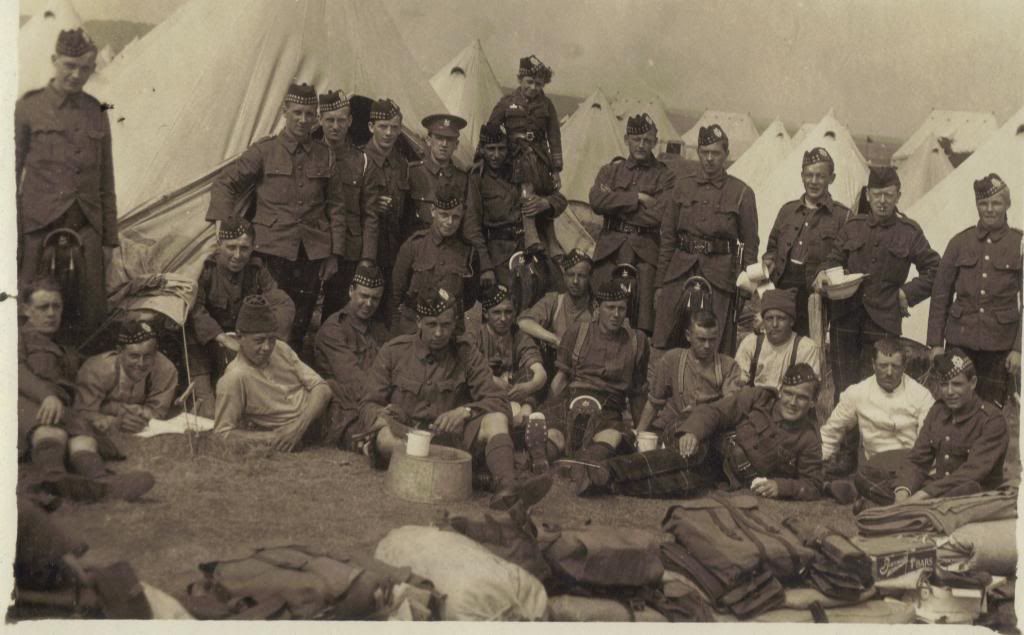
My Grandfather is below the chap in the cap.
The Batallion were moved to Guillemont on the Somme battlefield and on 8 August at 4.20am my Grandfather and the rest of the Liverpool Scottish attacked the German trenches.
He got to within 25 yards of the German line before he was shot through the back of the head and fell wounded into a shell crater. He lay there with two other wounded soldiers for more than 12 hours before a Captain of the Royal Army Medical Corps and two volunteers who were attached to the Liverpool Scottish got to the shell crater where he lay and managed to stretcher him back to safety. Though on the journey back through no-mans land German machine gun fire ripped through my Grandfather's arm and wounded the RAMC Captain.
Luckily my Grandfather despite his serious wounds received excellent medical treatment in France and the UK before he was discharged because of his wounds in September 1917.
The RAMC Captain who rescued him was Noel Chavasse and for the courage he showed that night he was awarded the Victoria Cross.
We went to Guillemont and visited the site of the battle where my Grandfather was wounded.
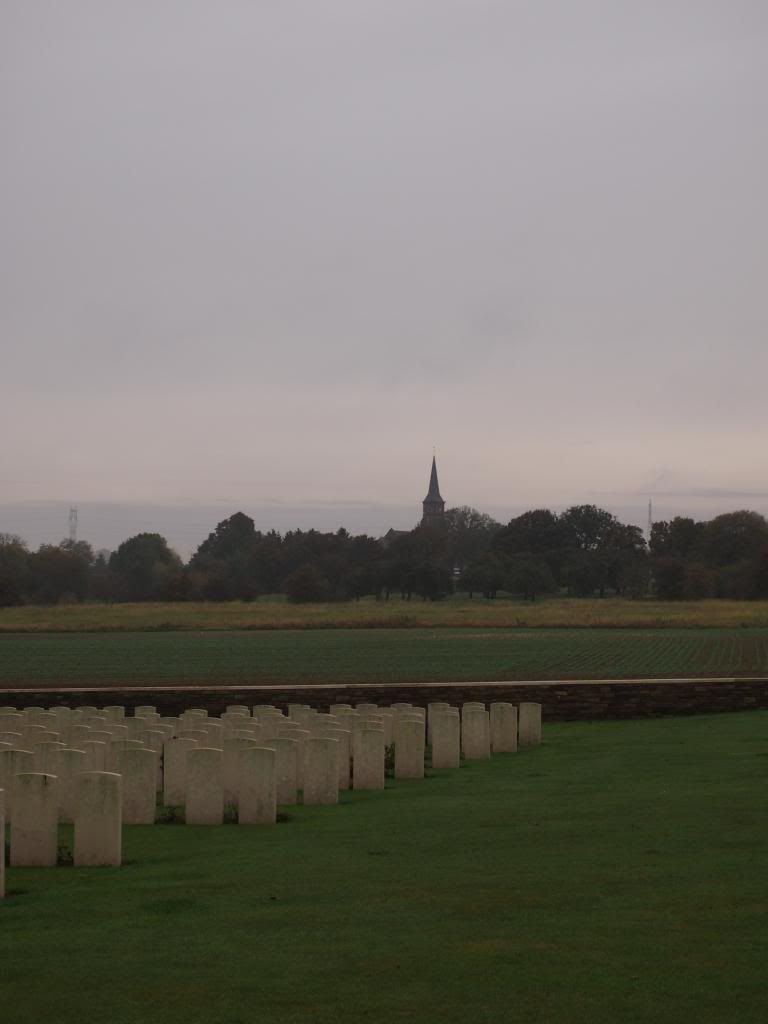
Our battlefield guide told us that to get from where the cemetery was to the church less than a mile away took the Allied troops nearly eight weeks of fighting.
We also visited Noel Chavasse's grave in Brandehoek near Ypres.
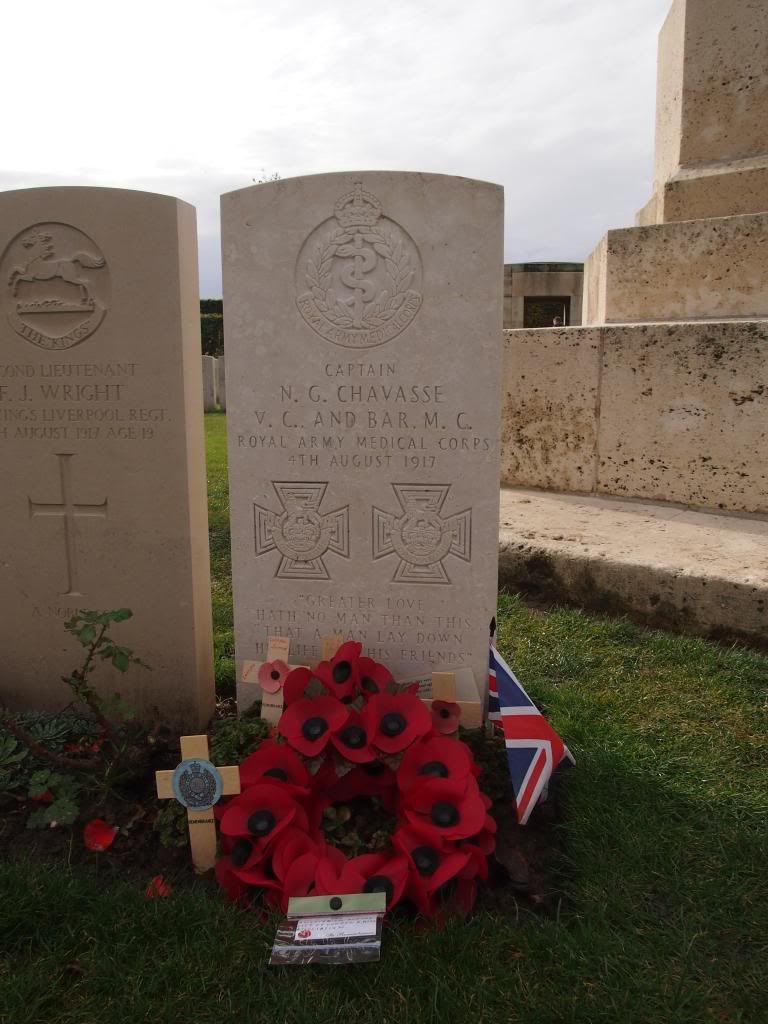
If you look at the headstone you will notice that two VCs are engraved. Chavasse was the only man to be awarded two Victoria Crosses during WWI. He died of his wounds in 1917 and was posthumously awarded his second VC for the bravery he showed rescuing and caring for dozens of troops whilst injured.
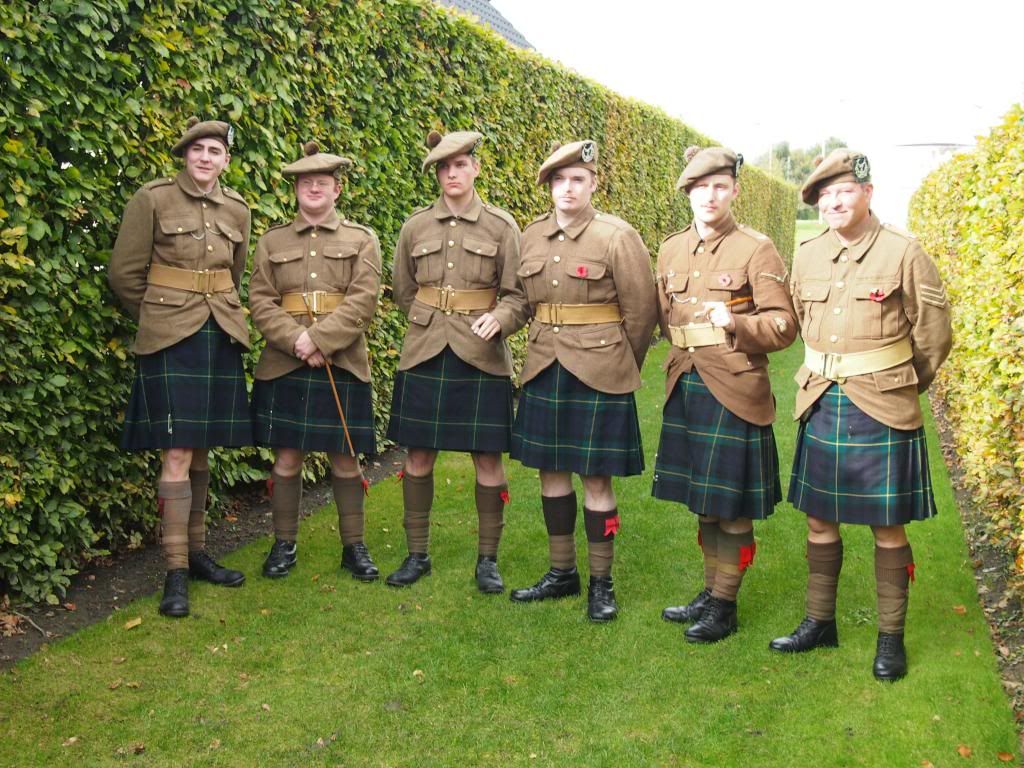
By coincidence when we visited Chavasse's grave current members of the Liverpool Scottish, now part of the Duke of Lancaster's Regiment were on their own pilgrimage in the area. They were in period uniform and just added to the atmosphere of the occassion. You will notice that the poppies on some of the soldiers are the Scottish four leaf design.
During our two day pilgrimage we visited the Menin Gate, Thiepval, the Lochnagar Crater, Tyne Cot and a few other Allied and German cemeteries. One of the most humbling experiences was on the Somme Battlefield near the Sheffield Park Memorial. On the path to it there were two cemeteries close by.
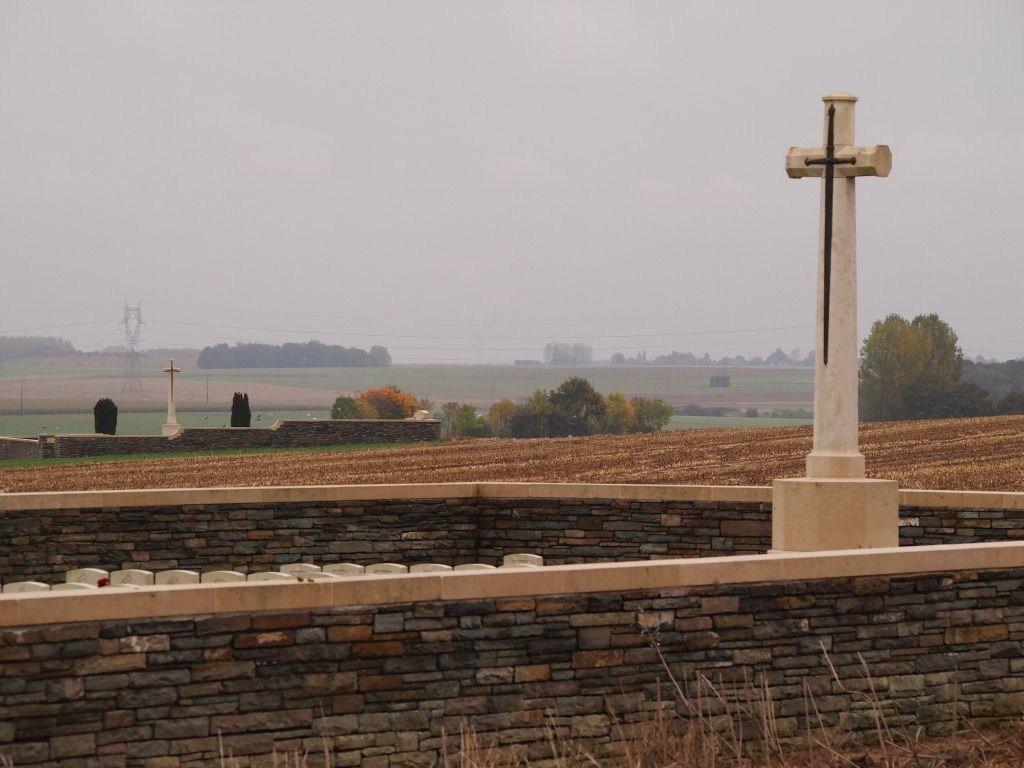
I asked our guide why they were so close and he replied the one we were next to was at the range of the German machine guns and the one further away was at the first line of barbed wire.
I for one am proud to wear my poppy as if it wasn't for the bravery of Noel Chavasse I wouldn't be here today.
I plan to go back on 8 August 2016 to Chavesse's grave to say thank you again on the centenary of the day my Grandfather was rescued.
We Will Remember Them.
Last year I was fortunate enough to recently go on a pilgrimage to the Somme and Ypres.
My Grandfather signed up on 31 May 1915 and joined the Liverpool Scottish and went to France on the 5 July 1916.

My Grandfather is below the chap in the cap.
The Batallion were moved to Guillemont on the Somme battlefield and on 8 August at 4.20am my Grandfather and the rest of the Liverpool Scottish attacked the German trenches.
He got to within 25 yards of the German line before he was shot through the back of the head and fell wounded into a shell crater. He lay there with two other wounded soldiers for more than 12 hours before a Captain of the Royal Army Medical Corps and two volunteers who were attached to the Liverpool Scottish got to the shell crater where he lay and managed to stretcher him back to safety. Though on the journey back through no-mans land German machine gun fire ripped through my Grandfather's arm and wounded the RAMC Captain.
Luckily my Grandfather despite his serious wounds received excellent medical treatment in France and the UK before he was discharged because of his wounds in September 1917.
The RAMC Captain who rescued him was Noel Chavasse and for the courage he showed that night he was awarded the Victoria Cross.
We went to Guillemont and visited the site of the battle where my Grandfather was wounded.

Our battlefield guide told us that to get from where the cemetery was to the church less than a mile away took the Allied troops nearly eight weeks of fighting.
We also visited Noel Chavasse's grave in Brandehoek near Ypres.

If you look at the headstone you will notice that two VCs are engraved. Chavasse was the only man to be awarded two Victoria Crosses during WWI. He died of his wounds in 1917 and was posthumously awarded his second VC for the bravery he showed rescuing and caring for dozens of troops whilst injured.

By coincidence when we visited Chavasse's grave current members of the Liverpool Scottish, now part of the Duke of Lancaster's Regiment were on their own pilgrimage in the area. They were in period uniform and just added to the atmosphere of the occassion. You will notice that the poppies on some of the soldiers are the Scottish four leaf design.
During our two day pilgrimage we visited the Menin Gate, Thiepval, the Lochnagar Crater, Tyne Cot and a few other Allied and German cemeteries. One of the most humbling experiences was on the Somme Battlefield near the Sheffield Park Memorial. On the path to it there were two cemeteries close by.

I asked our guide why they were so close and he replied the one we were next to was at the range of the German machine guns and the one further away was at the first line of barbed wire.
I for one am proud to wear my poppy as if it wasn't for the bravery of Noel Chavasse I wouldn't be here today.
I plan to go back on 8 August 2016 to Chavesse's grave to say thank you again on the centenary of the day my Grandfather was rescued.
We Will Remember Them.
Mine is a bit too in-depth to copy and paste, but I recently wrote blog posts on two of my Nan's uncles who died in the war.
James Henry Harris, died in Belgium in September 1915;
http://thebritishbibliophile.blogspot.co.uk/2013/0...
George Harris, fought in Gallipoli and survived, died in France in 1917;
http://thebritishbibliophile.blogspot.co.uk/2013/0...
James Henry Harris, died in Belgium in September 1915;
http://thebritishbibliophile.blogspot.co.uk/2013/0...
George Harris, fought in Gallipoli and survived, died in France in 1917;
http://thebritishbibliophile.blogspot.co.uk/2013/0...
From the link posted by Baldy1926 above:
The British reasons for going to war:
http://www.westernfrontassociation.com/great-war-p...
I wonder how many of the dead ever knew why they were fighting?
The British reasons for going to war:
http://www.westernfrontassociation.com/great-war-p...
I wonder how many of the dead ever knew why they were fighting?
My grandfather was one of the estimated 53,000* soldiers wounded at Gallipoli. 18 years old, a farmer boy, his first action, he lay on the beach waiting to be evacuated, terrified and covered in blood and flies, for 3 days under fire, after his foot was shot up. It gave him a life-long hatred of flies and wasps. I loved the awkward old bugger dearly 

- 78,000 acording to wiki
Edited by paul.deitch on Friday 11th October 21:27
Gassing Station | News, Politics & Economics | Top of Page | What's New | My Stuff



